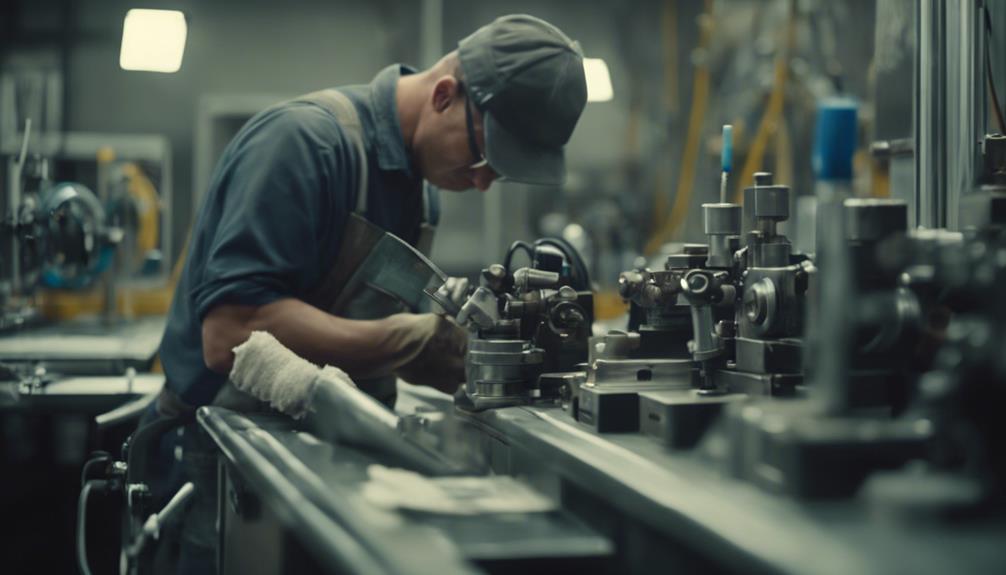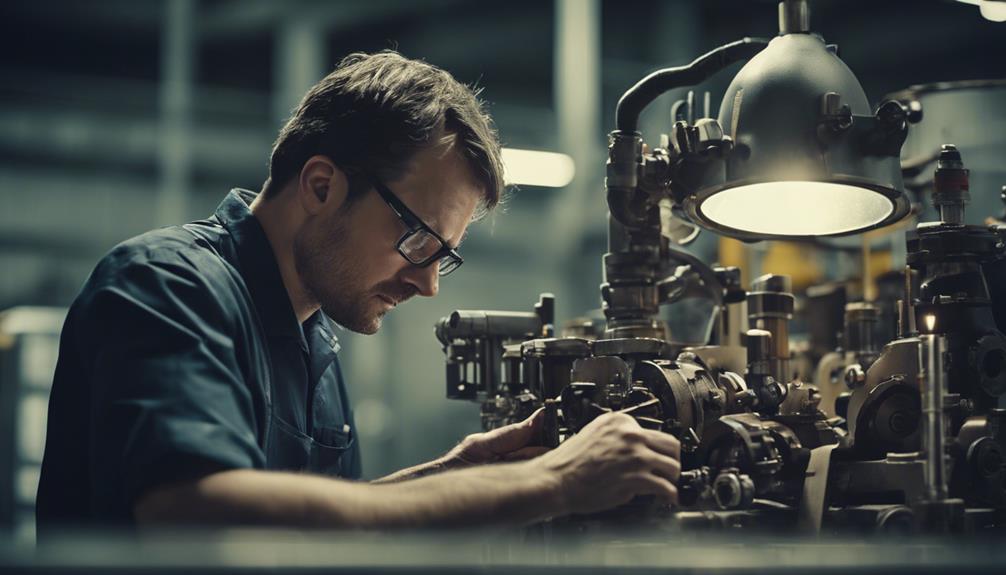For high-quality industrial machine maintenance, prioritize regular inspections to catch issues early, adhere diligently to maintenance schedules, and keep equipment clean and lubricated. Train employees on maintenance procedures for safety and performance, and promptly address any emerging problems. By resolving issues swiftly, you prevent costly repairs and downtime, ensuring peak performance. Also, consider implementing preventive maintenance strategies to identify failure causes and involve skilled technicians for maintenance tasks. Remember, these tips are just the beginning of maximizing your machinery's efficiency and lifespan.
Importance of Regular Machine Inspections
Regular machine inspections play an essential role in preventing unexpected breakdowns and costly repairs. By conducting preventive maintenance on your Regular Industrial Machine, you can effectively identify wear and tear on machine components before they escalate into major issues. These inspections are crucial for monitoring machine performance, ensuring peak efficiency, and extending the longevity of your equipment.
Additionally, regular inspections allow for timely interventions, reducing downtime and increasing productivity in the workplace. By addressing potential hazards through proper inspections, you enhance overall workplace safety, creating a secure environment for your employees.
As a result, by incorporating thorough inspections into your maintenance routine, you not only prolong the life of your machinery but also minimize the risk of unexpected failures and the associated expenses. Make regular machine inspections a priority to keep your operations running smoothly and safely.
Adhering to Maintenance Schedules
By consistently adhering to maintenance schedules, you guarantee the smooth operation and longevity of your industrial machines. Regular maintenance and preventive measures are essential for optimizing machine performance and efficiency.
Adherence to schedules greatly reduces the risk of unexpected breakdowns and costly repairs. Following a structured maintenance plan ensures that critical tasks are completed on time, helping to identify and address potential issues early on before they escalate into major problems.
Consistent adherence to maintenance schedules not only maximizes equipment longevity but also enhances operational efficiency. It's important to prioritize the adherence to maintenance schedules as it's a key factor in maintaining a safe working environment and minimizing downtime.
Proper Equipment Cleaning and Lubrication

To maintain peak performance and longevity of your industrial machines, it's essential to prioritize proper equipment cleaning and lubrication. Regular equipment cleaning helps prevent corrosion, rust, and debris buildup, ultimately extending the lifespan of your machines.
Proper lubrication is equally important as it reduces friction, wear, and heat generation, ensuring smooth operation and efficiency. Always use manufacturer-recommended cleaning products and lubricants to maintain peak machine performance.
Pay attention to cleaning hard-to-reach spots and applying rust preventatives to prevent costly repairs and downtime. Remember to replace old or bad lubricants before restarting machines to avoid damage and preserve equipment integrity.
Employee Training on Maintenance Procedures
Provide employees with comprehensive training on maintenance procedures to enhance workplace safety and equipment performance. Proper employee training plays an essential role in reducing accidents and injuries by empowering staff to identify and address maintenance issues promptly.
Well-trained employees not only improve equipment performance but also contribute to fostering a culture of safety and responsibility within the workplace. This culture not only ensures a safer environment but also leads to more efficient equipment maintenance, ultimately extending equipment longevity and minimizing costly repairs.
Timely Issue Resolution

Addressing issues in machine maintenance promptly is essential to prevent costly repairs and downtime, promoting peak performance and longevity of equipment. Regularly check your machines for any warning signs that may indicate potential issues. Taking a proactive approach to maintenance involves implementing a strategic plan to identify patterns of wear and tear. By adopting a predictive maintenance strategy, you can address issues before they occur, avoiding unplanned downtime.
Machines that are properly maintained operate more efficiently and have a longer lifespan. When you notice any abnormalities during routine checks, take immediate action to investigate and resolve them promptly. This quick identification and resolution of issues prevent them from escalating into major problems that could disrupt operations. By staying vigilant and addressing issues in a timely manner, you can ensure optimal machine performance, reduce the risk of accidents, and enhance overall productivity in your industrial operations.
Utilizing Maintenance Software Programs
When it comes to managing your industrial machines effectively, utilizing maintenance software programs can be a game-changer. These programs offer benefits like streamlined maintenance schedules, detailed reports, and easy access to equipment information.
Implementing maintenance software correctly can enhance your maintenance management practices and boost equipment reliability.
Software Benefits
By utilizing maintenance software programs, you can efficiently create and manage maintenance schedules for industrial machines. These programs track equipment performance and maintenance history, optimizing maintenance processes. They provide alerts for scheduled maintenance, reducing the risk of missed tasks and minimizing downtime.
Additionally, maintenance software allows for easy documentation of maintenance activities, aiding in compliance with regulations. By analyzing data and trends, these programs enable predictive maintenance strategies, enhancing machine reliability. With these software benefits, you can proactively address maintenance needs, improve equipment performance, and guarantee the smooth operation of industrial machines.
Implementation Tips
To effectively implement maintenance software programs for industrial machines, begin by establishing clear maintenance objectives and aligning them with the capabilities of the software.
Utilize maintenance software programs to schedule and track routine maintenance tasks efficiently, ensuring that equipment receives timely upkeep. These programs enable accurate record-keeping for maintenance procedures and histories, helping you adhere to manufacturer recommendations.
By creating maintenance schedules based on equipment manuals and requirements, you can streamline the organization of maintenance tasks. Additionally, maintenance software programs provide staff access to essential maintenance procedures, keeping everyone informed and ensuring tasks are completed promptly.
Embrace the benefits of maintenance software programs to enhance your industrial equipment maintenance practices.
Root Cause Analysis for Equipment Failures

When analyzing equipment failures, identifying the root causes is crucial to prevent future issues.
By conducting thorough root cause analysis, you can develop effective preventive maintenance strategies.
Utilize data-driven approaches to pinpoint failure causes accurately and implement corrective actions to enhance equipment reliability.
Identify Failure Causes
Conducting root cause analysis is essential for determining the underlying reasons behind equipment failures. When identifying failure causes, consider factors such as material fatigue, improper maintenance, and environmental conditions.
To effectively address these issues and prevent recurring failures, follow these steps:
- Analyze failure patterns: Utilize data-driven approaches to identify trends and patterns in equipment breakdowns.
- Determine root causes: Dig deep to uncover the specific reasons behind the failures, whether they stem from wear and tear, lack of maintenance, or external factors.
- Implement corrective actions: Based on the findings from the root cause analysis, take proactive measures to rectify the underlying issues and enhance equipment reliability and longevity.
Preventive Maintenance Strategies
Identify failure causes by examining equipment maintenance records to pinpoint potential issues before they escalate, an essential step in your preventive maintenance strategies for addressing equipment failures.
Root cause analysis is vital in preventive industrial machine maintenance as it helps determine the underlying reasons for failures. By conducting regular inspections and involving a qualified technician, you can detect signs of wear or potential issues early on.
Implementing a proactive maintenance approach based on root cause analysis enhances the effectiveness of your maintenance schedule. Understanding the root cause of equipment failures enables you to implement targeted solutions, ultimately improving equipment reliability and minimizing future breakdowns.
Prioritizing root cause analysis in your preventive maintenance strategies is key to ensuring the longevity and efficiency of your industrial machines.
Conclusion
To sum up, by following these top tips for industrial machine maintenance, you can guarantee that your equipment runs smoothly and efficiently. Remember, a well-maintained machine is like a well-oiled machine – it performs at its best when all parts are properly taken care of.
So, stay proactive, stick to your maintenance schedules, and address any issues promptly to keep your operations running smoothly. Keep your machines humming like a well-tuned engine!